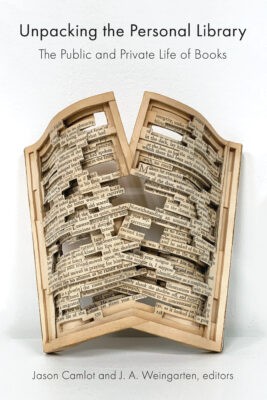What happens when books move from personal collections to public libraries? And how is intellectual life impacted by their donations? Unpacking the Personal Library tackles these movements in thirteen essays, most looking at the holdings of noted writers, academics, and politicians.
Bookshelves are physical indices of their owners’ minds, revealing the ideas, curiosities, and biases that have informed and inspired their reader. Essays on Virginia Woolf, Al Purdy, and Robert Duncan use posthumous collections as biographical clues by looking at physical traces like marginalia, bookplates, and general wear and tear to source literary inspiration and provenance.
Unpacking the Personal Library Wilfried Laurier University Press
The Public and Private Life of Books
Jason Camlot and J.A. Weingarten, editors
$71.99
cloth
288pp
9781771125680
This point is particularly salient when private libraries are willed to civic institutions, the focus of several essays in the collection. Once accepted, they become part of cultural life through their very availability, so that the act of donation is simultaneously one of self-insertion into public knowledge and historical narratives. Looking at several politicians’ donations in an essay on William Lyon Mackenzie King, Meaghan Scanlon notes that “While the facilities they created would be public, in the sense of being open to all, they would still be private in mandate.” Here, literary donations become a way of controlling public discourse from beyond the grave.
That same analysis takes a slightly more personal turn in Linda Morra’s essay on Canadian novelist and scholar Sheila Watson, which points to how her library’s bequest – in this case, pointedly separate from that of her husband, poet and playwright Wilfred Watson – asserts the collector’s autonomy as a public intellectual figure apart from her slightly-more-famous spouse in death. Anna Dysert argues that William Osler’s curation of medical texts (now the backbone of McGill University’s Osler Library) tacitly promotes a specific “great man” vision of history and technical development through its “valourization of the single author,” perpetuating that narrative of medical history.
The volume shows a radical counterexample in the libraries of some Occupy movements, which refused to curate content at all and would accept any book someone cared to donate. Indeed, the unstated kernel of many of these studies is class – book collecting and archival donation are hobbies for the rich. A personal library – basically, a book hoard large enough to require some system of cataloging – requires substantial cultural capital, leisure time, and resources, not only to acquire books but also to house them. Public libraries are widely available to anyone, but they are themselves often quietly founded upon the largesse of wealthy collectors’ donations.
This collection is academic in tone, offering diverse treatments of a pretty niche subject. While it includes ideas that would fascinate any bibliophile (Alberto Manguel’s essay on the Library of Alexandria is a standout), the volume’s unlikely to be read cover to cover without a deep preexisting intellectual investment in the subject at hand (as in, it’s either your thesis topic or your job). But for archive rats, librarians, and deep-dive historical lit nerds, Unpacking the Personal Library offers a prismatic lens on how libraries speak.
It’s an interesting moment to publish this exploration, at a time when our book collections have come to feel less like victories and more like burdens (if not fire hazards). As collections of physical books shrink alongside the digestion of online snippets, much of our reading becomes more accidental and ephemeral, leaving fewer traces of the ideas that have shaped us.mRb






0 Comments